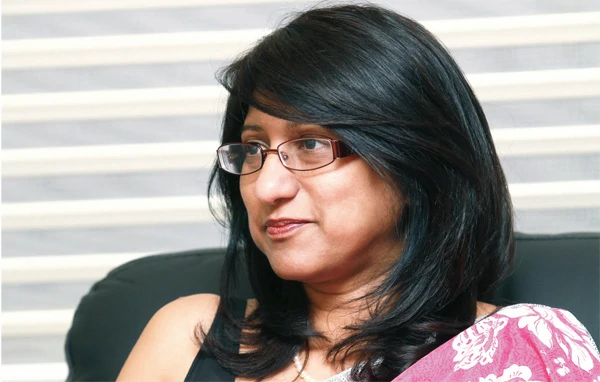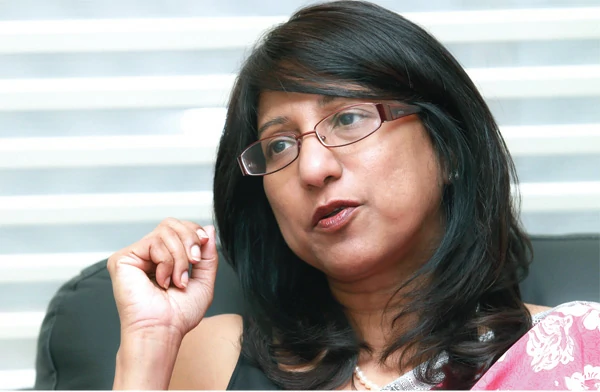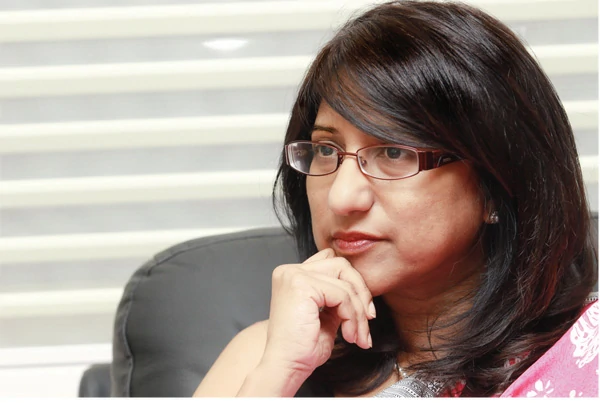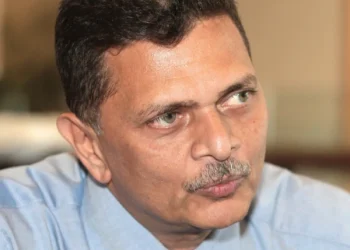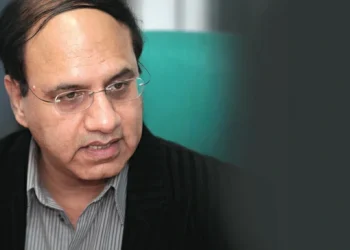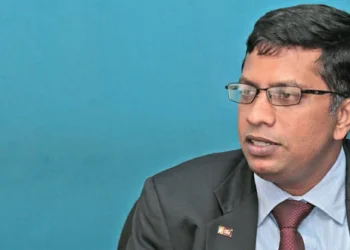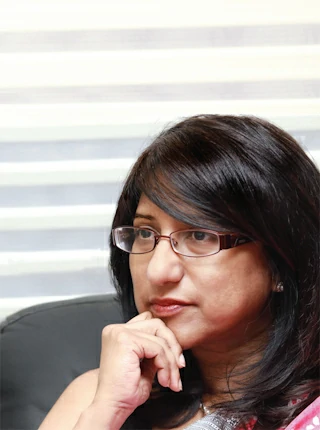
Nations Trust Bank (NTB) is a bank of the future. They have shed the conventional and literally taken banking to homes. Always open to change and able to manoeuvre in any situation, Nations Trust Bank could be taken as an example for others to follow. At its helm Renuka Fernando, CEO who has been with the Bank since its beginning, appreciates the dynamism of NTB and continues with innovation and an open mind as NTB shifts its gears to Growth Mode.
By Udeshi Amarasinghe
Photography Mahesh Bandara
You have risen up to the position of CEO through the Bank. Can you tell us about your journey so far?
I have been in banking for about 30 years. I have not worked in any other industry. I started my career in Hong Kong (HK) because I went to school and grew up there. It was a very vibrant place, an international financial hub and a very unique place. Hong Kong’s financial “buzz” tends to grow on you; when I was growing up I saw a massive stock market boom, which impacted even the normal man on the street. When I first started working, I witnessed the boom and bust in the HK property market. During the boom you could see half finished buildings being torn down even before completion to be replaced by even taller buildings with more floors.
Then of-course in the early 80s the property market crashed. We saw one of the biggest property scandals in HK unfolding at the time with the bankruptcy of the Carrian group. The fall of the Carrian Group impacted at least 70 percent of the 144 financial institutions operating in Hong Kong during that time, including my employer, because we were syndicate loan participants to some of the Carrian property developments.
I moved to Sri Lanka in 1986, when my parents came back here to settle down. I worked at Banque Indosuez and ABN AMRO before joining NTB. I have been very fortunate to begin my career in the foreign banking sector because you get a fantastic grounding; you learn good risk management practices, and the importance of process and policy which enables you to look at issues in a very structured manner. I feel it is very important to get that initial grounding when you first start to work because that is what holds you in good stead later on.
Unfortunately Sri Lanka has lagged behind the region in terms of growth due to the conflict and banks like Banque Indosuez and ABN AMRO moved out of the country because they didn’t see much of a future here. About ten years ago when ABN AMRO was moving out of Sri Lanka, I made a decision to move to a local bank. Nations Trust, at that time was a very small bank with only about four or five branches.
The change was huge for me. In the foreign banks we had a very structured environment where one is more of an implementer than a creator. Everything is well laid out for you in terms of risk appetite to operational policy and pricing, as well as customer segments and strategy, based on the banks global policies. But in a local bank you have to become a visionary and a creator. This was very challenging but very exciting at the same time. When I look back at that time, when I joined Nations Trust, it was actually a turning point for me in terms of really bringing out the best in me professionally. I felt that I was very fortunate because the Board at that time brought in a top management team, who were very similar in background to my own experience and professional values. Many of them had been in the foreign banking environment and gone through a similar cultural mindset and technical training to me and then like me, moved into this very small organisation with a determination to make it into a big player in the industry. We really did gel as a team and we brought in different strengths and different expertise to the table to make it a whole. Everyone made a contribution and above all we were all very passionate about taking Nations Trust to great heights. This is reflected in our success today.
The journey so far has been great for me. I have always considered myself very lucky to have been able to work for organisations with vibrant environments, great internal cultures and above all dynamic colleagues.
The banking sector in Sri Lanka is a male dominated sector, as such you are an inspiration to the women in this country. What can you tell us about this?
Many people ask me this question about how it feels to be a women in a male dominated sector. To tell you the truth, I don’t feel a difference.
I will not say that women do not face gender biases, but again I have been very fortunate to be able to say that I have not had any personal experiences which have made me feel that I am treated differently.
Perhaps it is the institutions that I have worked for, we have really had no such issues. Maybe in the corporate sector there are institutions where women get less recognition than men, but by and large I feel Sri Lanka is not that bad.
In Terms Of This Organisation We Are Very Ambitious. We Started Wanting To Run Before We Could Walk. That Has Its Own Challenges Because We Set Ourselves The Standards That We Want To Achieve.
I feel the real challenge for women here is the expectations from them to be a perfect wife, super mum and a top professional – all at the same time. We are still a pretty traditional society and expectations placed on them to manage the home and look after the children are pretty high. But to juggle all of this and still reach the top is a very big challenge because it is really difficult to be the best at all those things. Luckily we still have a “life line” in the form of extended family but that’s just not enough. The facilities in Sri Lanka, which enable women to balance all of this is still not up to standard and I am not sure how fast that aspect of it is changing.
Ultimately in the work place, it is about the individual and not the gender. You must be very smart at what you do, be an achiever and be able to work well with other people.
What are the challenges that you have faced and how have you overcome these challenges?
We are a very ambitious organisation. We started wanting to run before we could walk. That has its own challenges. Banking is about managing risks and when we look to growing fast, we need to balance that with the risk we can take. In the past when we were a smaller bank, it was very difficult to do all what we wanted to do, because size mattered.
Getting the right people was the biggest challenge. When we started our journey 13 years ago, we wanted to do things differently from the rest of the industry, change the way banking was thought of and make our organisation into a very customer centric one. We introduced everything from super market banking to 365 day banking and extended banking hours. We had sales staff going to the customer’s premises rather than expectnig the customer to come to the bank. This type of customer centricity required a complete mindset shift and a very open and dynamic internal culture. Therefore, we recruited a lot of young people who could adapt to this culture easily. But on the other hand, the challenge was that younger staff didn’t come with the wealth of experience older people in the industry come with.
We set about meeting those challenges by systematically enhancing the knowledge and skills of our staff. Today we are happy to say that we have a very capable team, not only at the senior levels but all the way down. It really paid off to recruit for mindset and attitude and then train for technical skills.
The banking industry globally is going through a tough period, what can you tell us about the situation in Sri Lanka and what measures has NTB taken to stay stable during this time?
Globally, 2013 looks to be somewhat stable. The thinking is that the crisis period is over, and in fact most places will go into a recovery stage, although “slow” and “fragile” are the terms being used.
Europe of course is in recession and is expected to stagnate in 2013, but the US has avoided the much talked about fiscal cliff. In this part of the world things look better with the Chinese economy expected to expand while India is set to increase by over seven percent. The growth in the emerging markets of Asia as a whole is expected to pick up. Overall, things look better than in 2012 and this will probably be reflected in the economic performance of Sri Lanka as well. The Road Map for 2013 announced by the Central Bank of Sri Lanka (CBSL) sets our GDP growth at 7.5 percent in 2013, while targeting single digit inflation, which is a priority and will be one of the key drivers of monetary policy. We believe that Sri Lanka’s medium term growth trajectory is very good. But, as a country we will need to manage the short term challenges of our trade balance, debt position, inflation and liquidity.
We Wanted To Do Things Differently To The Rest Of The Industry, Change The Way Banking Was Thought Of And Make Our Organisation Into A Very Customer Centric One.
In terms of the banking industry, there will be a lot of opportunities especially in the increased economic activity created by the five hubs plus tourism, development of the SME sector, the planned development of the corporate debt market, equities, and government securities. At Nations Trust we have just concluded our five year strategic plan and it is an ambitious one. We are very positive about Sri Lanka and we are ready to play our part in this growth story.
Despite the global shocks in the past, our financial sector in Sri Lanka remained fairly stable. Over the last few years, at Nations Trust we have invested significantly in improving our risk management framework and systems, along with the rest of the industry, especially in terms of operational and market risk management. We will continue to invest in adopting global best practices and skills, upgrading in this area. Capital planning and ensuring capital adequacy is another aspect we will focus on. We have a very strong governance culture at all levels of the organisation. We also have a robust succession planning mechanism to ensure sustainability of the bank.
What can you tell us about the performance of NTB since you were appointed as the CEO?
I became the CEO in September 2012. We did fairly well in 2012. We have just completed the formulation of our strategies for the next five years, against the back drop of a per capita income goal of USD 4,000 and a GDP growth of seven to eight percent. We are ready to capture the opportunities. There is a lot of excitement in the organisation with regard to these plans and everyone is ready to deliver the results we want to achieve.
We are expanding our footprint across the country and because we are very strong in our retail and cards businesses, we will be able to provide financial solutions to the emerging middle income earners with rising disposable incomes. We are capable of delivering products and services across the entire value chain of an industry because we have services and specialised products such as leasing and factoring along with the traditional banking products like trade services and working capital financing expertise. We have over the last two years also entered into the SME segment and have been commended by some of our international partners as having made remarkable progress despite being a late entrant.
We Have A Very Strong Governance Culture At All Levels Of The Organisation. We Also Have A Robust Succession Planning Mechanism To Ensure Sustainability Of The Bank.
From an efficiency and productivity point of view; we believe that the industry is facing narrowing margins and productivity is key. We feel that we are at the right juncture and size to take a serious look at our processes and delivery capability and ensure that they are streamlined and technologically enabled to be able to take on the volume growth. If we don’t do it now, we will be too big.
What can you tell us about the credit card business of the Bank?
The credit card section is a very important division of the Bank. Two years ago we experienced a bit of a shock because the CBSL brought in a ceiling on cards interest rates. It impacted the whole industry. But because the cards business is proportionately a large business for Nations Trust compared to other local banks, this had a significant impact to our entire bank. But within a year, we remodelled ourselves and reconfigured the whole business to recover from the impact of this interest rate ceiling. Today we are back on our feet and flying like we used to.
Actually when we look back at those two years, especially what we have done and how we have overcome this big change, it epitomises the nature of our whole organisation. It is in our DNA – to change, and be able to manoeuvre ourselves through difficulties is a must because we are not very big.
Presence in North and East?
We have six branches in the North and East. Business momentum is still gathering there and financial institutions must look to add value to this process. I feel there is a role we can play in terms of customer education especially in terms of the small and medium sized businesses and start ups.
What can banks do to make their services more customer friendly?
Usually when a person thinks about going to the bank, they tend to groan internally. But Banks have to start thinking like a retailer. We have to ask ourselves how we can make our interaction with our customer easy, convenient and attractive.
At Nations Trust, customer centricity in everything we do is a “must”. We have always believed that customer convenience is key. 365 day banking and extended hours are a reflection of this belief. We were also one of the first banks to do ‘banking at your door step’, which does even third party deliveries of cash.
…How We Have Overcome This Big Change, It Epitomises The Nature Of Our Whole Organisation. It Is In Our DNA – To Change, And Be Able To Manoeuvre Ourselves Through Difficulties Is A Must Because We Are Not Very Big.
Over the last year, we have focused on bringing digital solutions to our customers such as the mobile banking service and the SMS banking services we offer. Today a customer can do bill payments to third party transfers and settlement of loans and leases through our mobile banking offer. Customers can have SMS advices of any transaction they do on their current account or card, instantly. We will continue to enhance our digital delivery to customers.
But, this cannot happen without a human interface. Even if you look at developed countries the bank branches have not gone away. There was a time that people use to think the bricks and mortar will disappear and everything would be through internet banking. This did not happen. We are in the service industry and the human interface is very important. It is how you marry technology with the human aspect of servicing the customer that will be the winning solution. But it is important that we understand that one shoe does not fit all. We need to segment our customers and understand what delivery capability we offer to each segment.
What more can be done to improve the Banking sector in this country?
Banks in Sri Lanka are still relatively small in size and as stated by the CBSL, some consolidation will need to happen if we are to adequately support the growth targets for Sri Lanka. Perhaps that consolidation can happen also across the different segments in the industry between commercial banks and perhaps other financial institutions. But it has to be done carefully. It is not always easy to merge organisations and get one plus one to be three. There must be a matching of culture, systems and vision. Otherwise its going to be a long haul.
A lot has already happened in the industry in terms of bringing global best practices in risk management, compliance and governance over the last three to four years. On the customer side the CBSL is becoming more focused on safeguarding the customer‘s rights. We have had a customer charter introduced.
In terms of governance, Boards are now given frameworks on governance; not that we did not have that previously, but that has brought in standardisation across the sector. With regards to compliance a lot has happened. Anti-money laundering is one major area that the industry has been impacted with. Of course Sri Lanka is very small and some of the regulations that have come in for anti-money laundering as global best practices may not be too relevant for Sri Lanka. But we have had to adopt them because these are global standards. There have been huge changes, which have also necessitated investments in system.
On The Customer Side The CBSL Is Becoming More Focused On Safeguarding The Customer‘s Rights. We Have Had A Customer Charter Introduced.
How can people be encouraged to move away from the informal banking sector?
The informal sector has grown because access to finance in certain areas are very poor. Today products like pawning, gives quick, easy access to money. But everyone does not have gold to pawn. Therefore, the informal sector has grown and will continue.
The micro finance sector has to some extent, tried to replace the informal sector. If you look around, there are many micro finance organisations that have sprung up in the country. But they need to be regulated. There are very good micro finance institutions but since this sector is not really regulated, you will also get the unscrupulous institutions pretending to be micro finance also coming into the picture. That is one area that really needs to be developed and regulated and done in a very structured manner to reach those people in needs of finance.
The other reason as to why access to finance is limited is that even if you take a small company today, the financial data that they provide you is not sufficient for an assessment. It is very difficult because there is no formal methodology to assess them. It is in a very informal way that we asses even the smaller companies. They may not have audited accounts and other such formal documentation. It is really about educating customers, how to interact with the financier and what kind of information they need to give, what kind of disciplines they need to bring in. If we take this small and medium enterprises sector there is a lot of education that can happen where banks can play a role. That education process needs to be very structured. There are a lot development institutions that come into Sri Lanka such as the IFC and FMO. They lend money, but they also want you to bring that education and give these SMEs the tools to manage their businesses. Banks have to take part in this process.
We were one of the first banks to make available the SME tool kit that the IFC had brought in and we have rolled that out. The amount of interest that we have generated is enormous; it teaches SMEs things like finance and accounting, sales, human resource management, IT, which is required in their business. If we are to develop this segment in the medium term and be able to provide financing to this sector, banks need to start this education process now.
We Were One Of The First Banks To Make Available The SME Tool Kit That The IFC Had Brought In And Vwe Have Rolled That Out.
What can we expect from NTB in 2013?
We have many plans. 2013 is the commencement of the role out of those plans. You will have to wait and see.
